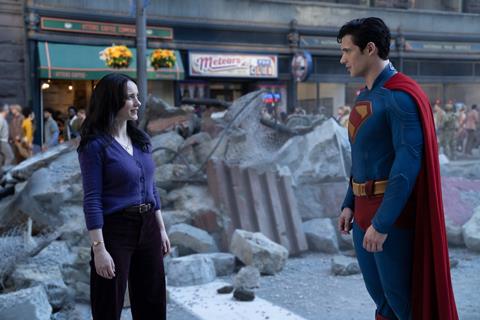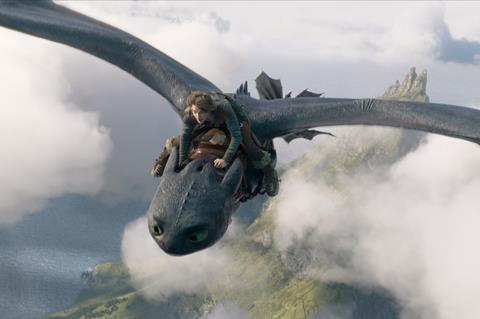Hollywood studios stepped up to the plate, delivering consistent hits this summer — and bouncing back from last year’s strike-dented calendar. But despite this, box-office growth hasn’t quite matched the season’s buoyant mood.

This year, the summer box office season has given studios and cinema operators plenty of reasons to be cheerful — most notably that it’s not summer 2024, which was adversely impacted by the Hollywood strikes depleting the release calendar. Instead, a steady stream of major releases — with little in the way of outright flops — has given cinemas a fighting chance in the marketplace.
“It’s been a strong summer overall,” is the verdict of Veronika Kwan Vandenberg, president of distribution at Universal Pictures International, which has scored the second- and third-biggest hits of the season globally with Jurassic World Rebirth and How To Train Your Dragon.
“It feels like an improvement on last year, and I think the box office reflects that,” comments Andrew Cripps, head of global distribution at Disney, which leads the summer box office chart with Lilo & Stitch. Cripps adds that although the frequency of major titles has still not caught up with pre-pandemic times, “you could argue the quality this year is up”.
Since the Covid pandemic, cinema operators have had to navigate a release calendar pockmarked by quiet periods lacking major titles. And when a tentpole film underperforms, where there is a big gap before the arrival of the next one, box office spirals downwards.
“It is broadly, year to date, a stronger year for cinema, and a big difference is the volume of films,” comments Eduardo Leal, group director of screen content at Vue International, which operates cinemas across multiple territories, most notably the UK, Germany, Italy and the Netherlands.
Summer 2025 hit peak frequency when F1 (aka F1: The Movie), Jurassic World Rebirth and Superman landed on consecutive weekends, followed two weeks later by The Fantastic Four: First Steps.
In summer 2024, only three titles — Inside Out 2, Deadpool & Wolverine and Despicable Me 4 — cleared $500m at the worldwide box office. So far this summer, as of mid-August, six films have passed $500m worldwide: Lilo & Stitch, Jurassic World Rebirth, How To Train Your Dragon, Superman, Mission: Impossible — The Final Reckoning and F1. The Fantastic Four: First Steps had reached $469m globally at press time, and might be the summer’s seventh $500m hit.
That looks like a strong recovery from summer 2024, but these numbers do not tell the whole story. While summer 2025 has shown a wider spread of wealth, the season has lacked a giant success equivalent to Inside Out 2 last summer ($1.70bn) or Barbie the year before ($1.45bn). Last summer also saw Deadpool & Wolverine hit $1.34bn worldwide, and Despicable Me 4 came in at $972m. Summer 2025’s three biggest titles at press time are Lilo & Stitch ($1.03bn), Jurassic World Rebirth ($829m) and How To Train Your Dragon ($626m). Among that trio, only the Jurassic film is likely to rise substantially before the summer ends, and the film’s transition to PVoD and digital download on August 5 won’t help.
North America

The summer box office in North America has been strong, with new films from Marvel and the newly named DC Studios pulling their weight in the domestic market. DC, under the new leadership of James Gunn and Peter Safran, needed to relaunch with a solid hit, and it achieved that goal with Gunn’s Superman — $341m domestically at press time, the second-biggest hit of the summer in North America, behind only Lilo & Stitch.
Marvel, which has wobbled in recent years, likewise needed to get back on track, and Matt Shakman’s The Fantastic Four: First Steps should help. At $247m in North America at press time, it’s the fifth-biggest hit of the summer in the domestic market.
The problem for the biggest two superhero films of the summer is the international component — where numbers failed to match domestic. Superman’s $595m worldwide total at press time splits 57% North America to 43% international. First Steps’ $469m haul splits 53%/47%. Most of the other big US titles this summer grossed more abroad than in North America, and that’s especially the case with F1, for which only 31% of the $590m total (at press time) came from North America.
F1 — based on a sport that is popular in every region — is the summer’s poster child for international success. No fewer than 12 international territories have grossed at least $10m with the film — compared with just five for Superman, from the same distributor.
Gunn commented that “Superman is not a known commodity in some places — he is not a big known superhero in some places like Batman is”, and that’s true. (In 2013, Man Of Steel was relatively soft in Germany, Italy and Japan.) Gunn also said: “It also affects things that we have a certain amount of anti-American sentiment around the world right now. It isn’t really helping us.”
Most media ignored the first comment and leaped on the second. If Gunn is correct, the situation is ironic — since Superman is himself an alien who, in the new film, acts to protect a weaker country (Jarhanpar), with a primarily brown-skinned population, from a powerful neighbour. The storyline is hardly Maga in sensibility. Jeff Goldstein, Warner Bros president of global theatrical distribution, dismisses the whole speculation. “There’s a whole bunch of superhero movies where the box office ratio is stronger on the domestic side,” he says.
Worldwide box office summer 2025 (May 2-Aug 17)
| Rank | Title (country of origin) | Distributor | Home country release date | Worldwide gross |
|---|---|---|---|---|
| 1 | Lilo & Stitch (US) | Disney | May 23 | $1.03bn |
| 2 | Jurassic World Rebirth (US) | Universal | Jul 2 | $829m |
| 3 | How To Train Your Dragon (US) | Universal | Jun 13 | $626m |
| 4 | Mission: Impossible — The Final Reckoning (US) | Paramount | May 23 | $597m |
| 5 | Superman (US) | Warner Bros | Jul 11 | $595m |
| 6 | F1 (US) | Warner Bros | Jun 27 | $590m |
| 7 | The Fantastic Four: First Steps (US) | Disney | Jul 25 | $469m |
| 8 | Thunderbolts* (US) | Disney | May 02 | $382m |
| 9 | Dead To Rights (China) | Niu Vision | Jul 25 | $358m |
| 10 | Final Destination Bloodlines (US) | Warner Bros | May 16 | $285m |
| 11 | Demon Slayer: Kimetsu No Yaiba Infinity Castle (Japan) | Toho | Jul 18 | $193m |
| 12 | Sinners (US) | Warner Bros | Apr 18 | $170m* |
| 13 | 28 Years Later (US-UK) | Sony | Jun 20 | $150m |
| 14 | Weapons (US) | Warner Bros | Aug 08 | $149m |
| 15 | Elio (US) | Disney | Jun 20 | $148m |
| 16 | Nobody (China) | Various | Aug 02 | $137m |
| 17 | Ballerina (US) | Lionsgate | Jun 06 | $135m |
| 18 | A Minecraft Movie (US-Swe) | Warner Bros | Apr 04 | $119m* |
| 19 | The Bad Guys 2 (US) | Universal | Aug 01 | $118m |
| 20 | Detective Conan: One-Eyed Flashback (Japan) | Toho | Apr 18 | $112m* |
| 21 | Karate Kid: Legends (US) | Sony | May 30 | $110m |
| 22 | Smurfs (US-Belg) | Paramount | Jul 18 | $105m |
| 23 | The Lychee Road (China) | Shaw | Jul 18 | $93.7m |
| 24 | Freakier Friday (US) | Disney | Aug 08 | $86.3m |
| 25 | Materialists (US) | A24/Sony | Jun 13 | $75.2m |
| 26 | The Naked Gun (US) | Paramount | Aug 01 | $72.9m |
| 27 | Kokuhô (Japan) | Toho | Jun 06 | $65.1m |
| 28 | I Know What You Did Last Summer (US) | Sony | Jul 18 | $63.0m |
| 29 | The Legend Of Hei 2 (China) | Shanghai Maoyan | Jul18 | $56.5m |
| 30 | The Accountant 2 (US) | Warner Bros | Apr 25 | $53.7m* |
Source: Comscore/film distributors *Box office for measured period only.
Winning streak
This summer, Warner Bros has six of the top 20 titles at the North America box office: four summer releases (Superman, F1, Final Destination Bloodlines and Weapons) plus two holdover titles from April (Sinners and A Minecraft Movie).
“We’re calling it our six-pack of hits,” enthuses Goldstein. All six debuted at the top of the North American box office, with at least a $40m opening weekend — the first time a studio has ever achieved this with six consecutive releases. Earlier this year, industry gossip swirled around the tenure of seemingly beleaguered Warner Bros Motion Picture Group co-presidents Pam Abdy and Mike De Luca — but not any more. The success of Zach Cregger’s original story Weapons, in particular, is a boost for the studio — originally dated for Martin Luther King weekend 2026 until audience testing prompted Warner Bros to pull it forward to August.
Existing-IP films tend to dominate the blockbuster-heavy summer season, but there are counter-examples. “I’m one of these who believe that the calendar is 12 months a year, and there’s always a good moment for an excellent new story that hasn’t been told before,” says Goldstein, who points to the success of Oppenheimer in summer 2023, and Warner Bros’ own 2018 hit The Meg.
Weapons brought some much-needed strength to August — the film had reached $89m in North America and $149m globally at press time. But overall, after a relatively strong May and June, the summer hasn’t lived up to the optimism that bubbled up early in the season. Warm critical and audience responses to The Fantastic Four: First Steps encouraged the notion that here was a Marvel film that might achieve a strong sustain. But after a powerful $218m worldwide debut, rapid burnout set in. After 26 days, the film had achieved a total just 2.15 times that opening number.
“My sentiment has changed over the course of the summer,” comments Paul Dergarabedian, senior media analyst at Comscore. “I was very bullish that we would get to $4bn for North America this summer, and now I’m not so sure. It just proves that in the summer, you have to have every movie at least perform to expectations — otherwise, it’s a very fragile ecosystem.”
For the first 15 weeks beginning the first Friday in May, North American box office is tracking 3.1% ahead of the equivalent period in 2024 — not quite the healthy uptick on last summer that was initially anticipated. Domestic box office reached $3.68bn for the summer (first Friday in May to Labor Day Monday) in 2024. A 3.1% rise on that would yield a total of just $3.79bn for this summer. In the decade before the pandemic, total summer box office fell below $4bn only once in North America — in 2017 ($3.86bn).
Worldwide growth

Film data and insights specialist Gower Street offers a similar scenario for worldwide summer box office, and is forecasting an $11.79bn total for May, June, July and August combined, which compares with $11.36bn achieved in the same period in 2024. If that forecast proves accurate, it would be a 3.8% rise.
Gower Street director of theatrical insights Rob Mitchell, assessing the global picture, echoes Dergarabedian’s perspective on domestic. “You had a lot of strength early in the summer, maybe from things people didn’t automatically expect to be so big,” he says. “I think a year ago, maybe even six months ago, you wouldn’t have looked at Lilo & Stitch and said, ‘That’s going to be the first US studio film this year to gross $1bn.’”
Lilo & Stitch is the first — and only — US studio film this year to pass that milestone. “It’s unfortunate that July didn’t match up to last year,” says Mitchell, “because there were quite a lot of big titles in the mix.”
Mitchell points out that all three previous Jurassic World films grossed more than $1bn worldwide. “Jurassic World Rebirth will probably end up about $850m, and it’s ridiculous that a film grossing $850m could in any way be seen as slightly disappointing. That is a great success. A good chunk of where it’s lost out is China, where it did succeed, but only to about half of what the last one did.”
China presents a conundrum to box office analysts this summer. Several US blockbusters are seen to have done well in China, especially Jurassic World Rebirth ($78.1m), F1 ($58.4m) and Mission: Impossible — The Final Reckoning ($64.6m). How To Train Your Dragon is also considered a win, with $39.5m in China. Less impressively, Superman had reached $8.9m in China at press time, and The Fantastic Four: First Steps stood at $5.5m.
Compared with the pre-pandemic era, all of the above Chinese box office numbers are soft. Meanwhile, the big hit of the summer in China is local title Dead To Rights, about the Nanjing Massacre of 1937-8, with $358m at press time.
UPI’s Kwan Vandenberg views the glass as currently half full in China — especially when you consider that, in recent years, many major US films struggled to achieve release. “Post-pandemic, we saw a decline of films that were getting accepted into the marketplace in China, and a shifting away in terms of taste,” she says. “We’ve seen a nice spread across the performances of the Hollywood films this summer in China, which is promising for the marketplace.”

In addition to Dead To Rights, China’s summer local hits include animation Nobody ($137m at press time). From Japan, anime Demon Slayer: Kimetsu No Yaiba Infinity Castle, just beginning its international rollout in mid August, stood at $193m.
Perhaps the real rosy story about the 2025 summer box office is less the modest growth from 2024, and more about what individual successes portend for the future. At Universal, the success of How To Train Your Dragon was vital — not only are two sequels coming, but this is the studio’s first attempt at a live-action remake of a DreamWorks Animation film. If more animated titles can be successfully remade, that’s a big win.
How To Train Your Dragon is not the only outcome of consequence.
“If we think about what were the most important films of the summer in terms of what they mean for the industry, F1 was one of them,” says Vue’s Leal. “We wanted Apple’s biggest investment in cinema to really work and connect, because it gives Apple encouragement to keep doing this. They’ve expressed many times that they do believe that theatrical will elevate their films, and be a catalyst for global storytelling.
“And the other one is Superman” adds Leal. “The reboot of DC was a big deal with James Gunn. We really needed that to work, and it has.”

























No comments yet